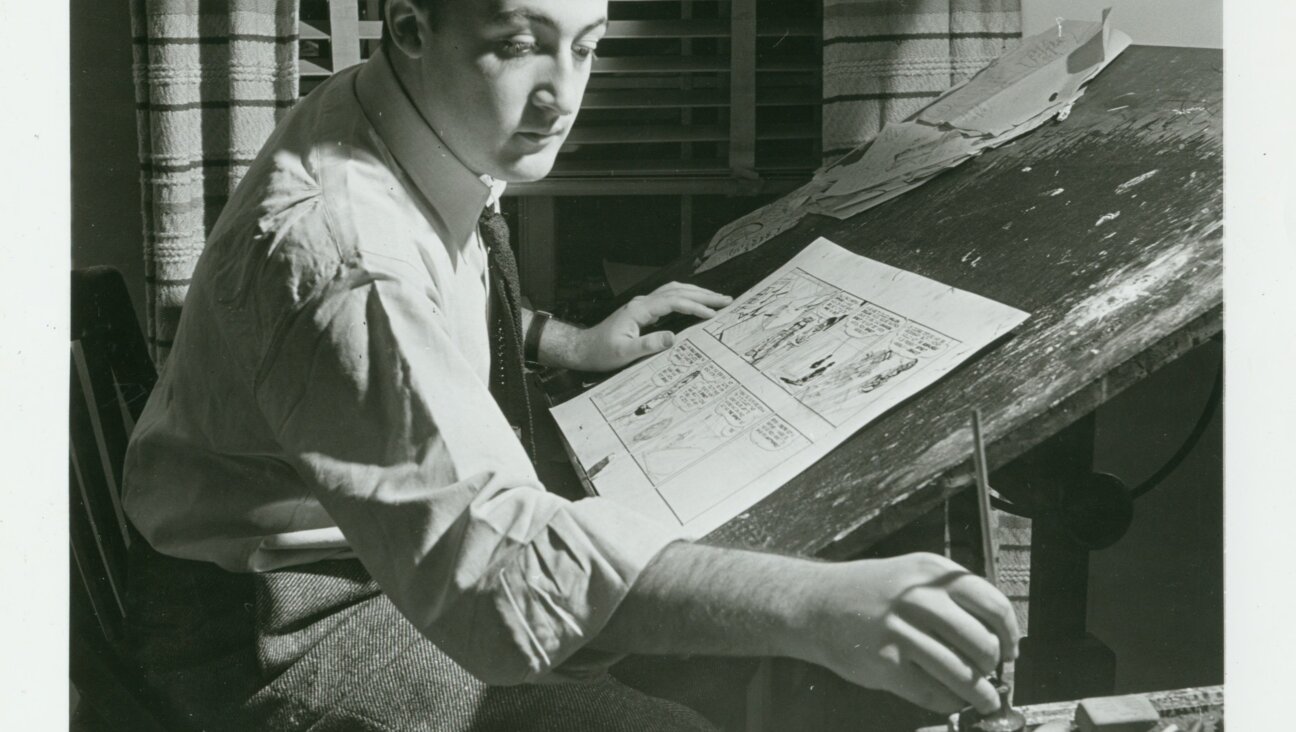Difference Between a Slob and a ‘Zhlob’

Graphic by Angelie Zaslavsky

Sloppy Seconds Can a zhlob be a neat freak? It?s possible, writes Philologos. Image by die volkskrant
Judith Ronat writes from Kfar Saba in Israel:
“The etymologies in my dictionary don’t support any connection, but I would like to hear your opinion. Is there any connection between the Yiddish word zhlob and the English ‘slob’?”
There is a connection, but it’s not etymological. Rather, it’s that English “slob” has influenced the meaning of Yiddish zhlob (pronounced with the “o” as in “soft”), so among some speakers in America today, a zhlob and a slob are practically synonymous. And yet in Yiddish, as in the Slavic languages it took the word from, a zhlob needn’t be a slob at all. He can comb his hair every morning, polish his shoes, tuck his shirt neatly into his trousers and still be a zhlob, provided he’s ill-mannered, ungainly and slow-witted.
Yiddish zhlob comes from Polish żłób (pronounced “jwub”). Although żłób literally means “feed trough,” it also means an “oaf,” “dolt” or “coarse-mannered country yokel.” In Ukrainian, in which a trough is a zholobok, zhlob has the same meaning, and zhlobstvo or “zhlobism,” so I’m told, refers to a kind of crude rural culture, a Slavic version of America’s world of the redneck. Since Eastern European Jewry, however, produced no rednecks, a zhlob in Yiddish is simply a big, uncouth person, the kind who steps with all his considerable weight on your toes that he hasn’t noticed and doesn’t bother to say “Excuse me.”
Why should a word for a feed trough have come to have such meanings? Perhaps the clue lies in Russian, in which such a trough is a zhelob, which also means “miser” or “tightwad.” A trough is something a farmer pours food into, and it may be that the word started out colloquially in Polish, Ukrainian and Russian alike, in the sense of a voracious peasant, and then split in two directions: that of bumpkinish uncouthness in Polish and Ukrainian, and that of greediness in Russian.
English “slob” has a more complicated ancestry. It’s been traced to Irish slab, meaning “mud,” “mud flat,” “muck” or “mess,” but it also appears to owe something to “slobber,” which once meant “mud” or “slime” as well as “drool,” and also to “slubber” (“to stain” or “to soil,” or “to do slovenly work”) and to “slop” and “sloppy.” Indeed, the whole slob-slobber-slubber-sloppy-slovenly complex represents such a tangle of words with similar meanings that it’s all but impossible to disentangle them and determine which preceded or influenced which. Words are social animals just like people; they congregate together, form friendships and associations, and attract other words to join them.
And that’s what seems to be happening to “zhlob,” so that we’re now dealing with the slob-slobber-slubber-sloppy-slovenly-zhlobby complex. Yet we Yinglish purists should try to maintain the distinction: A zhlob is a zhlob and a slob is a slob. You can even be a slob — but not a zhlob — and a witty intellectual. Zhlobs are gross; slobs are messy. The two can overlap — as at the dinner table, for example — but they don’t necessarily have to. A feeding trough is not a mud flat.
•
Anti-Semitic cartoonists in the European press are something that, unfortunately, one has gotten used to in recent years, but surely they could at least learn some Hebrew. Don’t these people know how to use a dictionary properly?
Take a look at the cartoon by Jos Collignon reprinted above this column, which appeared in mid-March in the Dutch tabloid De Volkskrant, the third most widely circulated newspaper in Holland. It shows Geert Wilders, the controversial right-wing Dutch politician who has been accused of anti-Muslim bigotry, being handed a stack of bills by an invisible Israeli or Jewish backer. Why do we know that the backer is either Israeli or Jewish? Because as Wilders prepares to stash the money in his inside jacket pocket, something is being said to him that appears in Hebrew letters — and although De Volkskrant’s readers are not expected to read Hebrew, they were clearly expected to identify the language the letters belonged to.
What is being said to Wilders? The two words in the cartouche are b’nimus toda, which literally translates as “Politely thanks” — and if that sounds strange in English, it sounds just as strange in Hebrew. It’s only when you translate it back into Dutch as “Alstublieft, dank U wel” that it makes some sense.
“Alstublieft” is Dutch for “If you please,” and it’s what you say when handing something to someone, as a ticket to a train conductor or a fare to a taxi driver — or, for that matter, a wad of money to a politician for services rendered. And how, if you were a Dutch cartoonist, would you go about saying that in Hebrew? Not, of course, by asking someone conversant with the language, who would have told you that the appropriate word is b’vakasha; no, you wouldn’t want to have to talk to any of those unpleasant characters. What you would do is go to a Dutch-Hebrew dictionary, look up the word beleefd, “politely,” which is the nominal form of the verb believen, “to please,” discover that in Hebrew it’s b’nimus, and put two and two together to get 11.
If you were a zhlob of a Dutch cartoonist, that is.
Questions for Philologos can be sent to [email protected]















